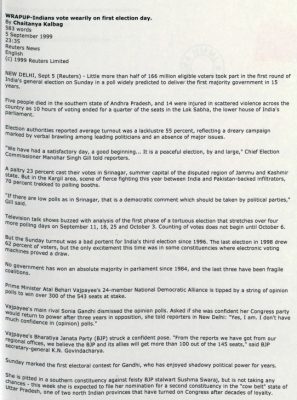WRAPUP-Indians vote wearily on first election day
[Reuters]
Published date: 5th Sep 1999
5 September 1999
Reuters News
English
(c) 1999 Reuters Limited
NEW DELHI, Sept 5 (Reuters) – Little more than half of 166 million eligible voters took part in the first round of India’s general election on Sunday in a poll widely predicted to deliver the first majority government in 15 years.
Five people died in the southern state of Andhra Pradesh, and 14 were injured in scattered violence across the country as 10 hours of voting ended for a quarter of the seats in the Lok Sabha, the lower house of India’s parliament.
Election authorities reported average turnout was a lacklustre 55 percent, reflecting a dreary campaign marked by verbal brawling among leading politicians and an absence of major issues.
“We have had a satisfactory day, a good beginning … It is a peaceful election, by and large,” Chief Election Commissioner Manohar Singh Gill told reporters.
A paltry 23 percent cast their votes in Srinagar, summer capital of the disputed region of Jammu and Kashmir state. But in the Kargil area, scene of fierce fighting this year between India and Pakistan-backed Infiltrators, 70 percent trekked to polling booths.
“If there are low polls as in Srinagar, that is a democratic comment which should be taken by political parties,” Gill said.
Television talk shows buzzed with analysis of the first phase of a tortuous election that stretches over four more polling days on September 11, 18, 25 and October 3. Counting of votes does not begin until October 6.
But the Sunday turnout was a bad portent for India’s third election since 1996. The last election in 1998 drew 62 percent of voters, but the only excitement this time was in some constituencies where electronic voting machines proved a draw.
No government has won an absolute majority in parliament since 1984, and the last three have been fragile coalitions.
Prime Minister Atal Behari Vajpayee’s 24-member National Democratic Alliance is tipped by a string of opinion polls to win over 300 of the 543 seats at stake.
Vajpayee’s main rival Sonia Gandhi dismissed the opinion polls. Asked if she was confident her Congress party would return to power after three years in opposition, she told reporters in New Delhi: “Yes, I am. I don’t have much confidence in (opinion) polls.”
Vajpayee’s Bharatiya Janata Party (BJP) struck a confident pose. “From the reports we have got from our regional offices, we believe the BJP and its allies will get more than 100 out of the 145 seats,” said BJP secretary-general K.N. Govindacharya.
Sunday marked the first electoral contest for Gandhi, who has enjoyed shadowy political power for years.
She is pitted in a southern constituency against feisty BJP stalwart Sushma Swaraj, but is not taking any Chances – this week she is expected to file her nomination for a second constituency in the “cow belt” state of Uttar Pradesh, one of two north Indian provinces that have turned on Congress after decades of loyalty.
Over 619 million voters – one-tenth of humanity – are eligible to take part in the world’s biggest electoral exercise, spread over 800,000 polling stations from snowy Himalayan heights to the sand-blown Thar desert.
Some 500,000 police and paramilitary troopers will monitor the election, which has been staggered for security reasons.
Vajpayee’s coalition lost a confidence vote by a single vote last April. Fresh elections were called when Congress failed to form an alternative administration.






